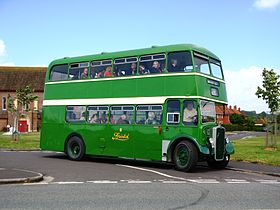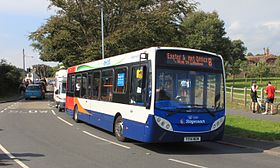

Bristol Omnibus Company
The Bristol Omnibus Company traces its origins to 1875, when George White formed the Bristol Tramways Company and began a horse drawn service in Bristol from Upper Mauldlin Street to Blackboy Hill. In 1887 the Bristol Tramways Company merged with the Bristol Cab Company to form the Bristol Tramways & Carriage Company.
In 1887, the company began a horse-bus service to Clifton, and later started several more horse-bus services to complement the tramways. In 1892, the Imperial Tramways Company moved its headquarters from London to Bristol. George White and the senior management team of Bristol Tramways also ran Imperial Tramways, though they remained separate companies.
In 1895, the company began to operate electric trams, and in 1906 introduced motor buses on the route between the Centre and Clifton. Rapid expansion of its bus services followed, in both Bristol and the surrounding country areas. The company opened branches in Bath in 1909, Weston-super-Mare in 1910,Cheltenham in 1912 and Gloucester in 1913. In 1912 the company also bought the Clifton Rocks Railway, which closed in 1934. After World War I more branches were opened in Swindon (1921), Wells (1922) and Coleford (1924).
The company was not satisfied with the performance of the first buses it bought, and in 1908 began the manufacture of its own buses. The company soon began to sell its buses to other operators. For 75 years, Bristol buses were widely used in the United Kingdom, and were also exported to many countries.
The Bristol scroll logo was adopted from the Bristol Aeroplane Company (a company that had been set up by White) to commemorate the building of Bristol Fighters at the Tramways Brislington Works during World War I.
In 1928, the company acquired control of another Bristol company, Greyhound Motors, which had started the first long distance coach service between Bristol and London in 1925. The company continued to operate its coach services under the Greyhound name until 1972.
In 1929, the White family sold its controlling interest to the Great Western Railway, but by 1932 the railway sold its interest to the Western National Omnibus Company, half owned by the GWR and half by the Tilling Group. In 1932, the railway transferred some of its bus services to the company, in the Swindon and Weston-super-Mare areas and the service between Cheltenham and Oxford.
In 1930, the company sold its taxicab operations, which it had run since 1887, first with horses and from 1910 with motors.
Outside Bristol the company had operated a mostly rural bus network, but in 1936 the company took over the city bus services in Gloucester and later that year took over the two companies operating trams and buses in the city of Bath, including Bath Electric Tramways Company.
In Bristol, the Corporation had the power to purchase the Bristol tramways. The option was never exercised, but led in 1937 to the formation of Bristol Joint Services, a joint undertaking between the company and the Corporation which controlled Bristol's city buses (and initially also its trams) until 1978. The difference between the two operations was not generally apparent to the public as the same livery was used, differing only in the fleetname detail. Furthermore, there were regular loans of vehicles between the two organisations, and the fleet was numbered in a common series.
In 1941, the last of Bristol's trams ceased operation, and from then on the company only operated buses and coaches – although it kept the Bristol Tramways name for some years.



First West of England
In September 1983 the National Bus Company split the operation in two, with the Cheltenham and Gloucester Omnibus Company taking the services in Cheltenham, Gloucester, Stroud and Swindon. The remainder stayed with the existing Bristol Omnibus Company, divided into two business units: Citybus for services within Bristol, and Bristol Country Bus for services in Bath, Somerset and Wiltshire.
Badgerline was formed in 1985 as the business name of the Bristol Country Bus and in 1986 its assets were transferred to a separate legal entity and privatised in September 1986 in a management buyout.
In September 1987, City Line (formerly Citybus) was sold to Midland Red West which in April 1988 was purchased by Badgerline. After Badgerline merged with GRT Group to form FirstBus in April 1995. In 1996 Badgerline was merged back into City Line, the City Line operation was rebranded as First Bristol.
Southern National was formed in 1983 as the Somerset and Dorset operations of Western National (then part of the National Bus Company). It was privatised in 1988, acquired by FirstGroup in 1999 and rebranded as First Southern National.
In 2001 FirstGroup changed the legal structure of some of its bus operating subsidiaries. The legal entity which had been Badgerline Limited was renamed First City Line Limited and became the operator of Bristol city services (now First Bristol Limited). The legal entity which had been First Bristol Buses Limited (which had previously been Bristol Omnibus Company, incorporated in 1887) was renamed First Somerset & Avon Limited in May 2003 after merging with Somerset operations of First Southern National.
In 2013 buses started to be painted into the new First Bus livery and 'West of England' branding was applied on both sides beneath the windows (on some single-decks the branding is applied above the windows towards the front of the bus). First Somerset & Avon is still printed on some tickets, while other tickets are printed with First Bristol & Avon or just First Bristol.
In February 2014, First's Bridgwater and Taunton business was transferred to First South West and rebranded as The Buses of Somerset in an unprecedented break from the FirstGroup corporate style. The business instead now sports a two-tone green and cream livery with bespoke branding, website and social media profiles. These services were later transferred to First South West.
In December 2016 all services operated by First Bristol transferred to First Somerset & Avon,
which was officially renamed First West of England in June 2017, meaning Bristol city services are once again operated by the same legal company as when they first started in 1875.




Stagecoach South West
From a slow start Exeter has become one of the first cities in the UK to have a fleet of entirely low-floor buses after introduction of the buses to the A and H service. Some radial services from Exeter are also operated by low-floor buses from Exeter, such as the X46, 56, Culm Valley 1/1A/1B, the Sidmouth services 52, from late 2006.
Several Exeter city services have been upgraded, including service F splitting into two, the F1 & F2; and service A having the first Dennis Darts with Pointer 2 bodywork vehicles in Exeter.
Alexander Dennis Enviro400s were purchased in May 2008 for the new 2 and 2A which replaced the 85 and 85A.
Changes to routes in Exeter in September 2007, with the withdrawal of service T, and R and S running in daytime only, caused outrage amongst residents of the affected areas.
In October 2007, Devon County Council announced that it would fund Stagecoach until March 2008 to run a partial service T and resume the R and S service in the evenings. This was due to the council receiving over 80 letters from passengers.
The services resumed partially in late October and fully in November, before Devon County Council will review the service's usage.
In December 2009 Stagecoach commenced operating three park & ride services in Exeter with 13 buses painted in dedicated liveries for the three routes.
In September 2013 two Stagecoach Gold routes were scheduled to be introduced in competition with First Devon & Cornwall's routes X80 and X81. Running from Torquay to Totnes every 30 minutes they will operate alternatively to Dartmouth and Plymouth.
In September 2015 First Devon & Cornwall withdrew their network of services in Plymouth and South Devon. Stagecoach acquired their depot in Plymouth along with its outstations in Tavistock and Dartmouth and introduced a smaller network of routes in their place. The First park and ride fleet initially remained at Plymouth on hire to Stagecoach along with buses transferred from Stagecoach Manchester and Stagecoach East Kent as well as other locations. This was temporary as an order of 27 Alexander Dennis Enviro 400 MMCs, 22 of which were to be allocated to the Plymouth depot for the 1/X1 and 3 Services and 100/101 Park & Ride services along with 5 Alexander Dennis Enviro200 MMCs for the 200 Park and Ride. Other services operated in Plymouth are the 2/2A and 48, alongside certain workings on the Stagecoach Gold route from Torbay that launched two years earlier, and a working on the X38 transferred from Exeter.
In February 2016 Stagecoach Launched the South West Falcon, an express coach service between Plymouth and Bristol It also stops at other key stops including Exeter, Taunton and Bristol Airport. During its first month a special promotional offer allowing a return anywhere for £1.
In September 2017, Stagecoach implemented the first major 'shake-up' of it's Plymouth based services since takeover in 2015. The route X1 that ran from Plymouth to Tavistock via Manadon Flyover was rerouted to follow the route 1 via Derriford Hospital to provide a standardised frequency. Route 2/2A saw an increased frequency in Plymstock with a new 2B variant introduced. Stagecoach also won the contract to run route 36 previously operated by Plymouth Citybus which connects Plymouth City Centre with Plymouth City College. Routes 100/101 were amended to serve Derriford Hospital throughout the day, creating a direct link to Plymouth Station. Route branding was introduced on routes 1, 2/2A, 2B and 36 and park & ride branding updated.

Wessex Bus
In June 2007 the bus side of the South Gloucestershire Bus & Coach was purchased by Rotala subsidiary Flights Hallmark trading as Wessex Connect. The purchase included 68 buses and was completed in stages until 31 March 2008, this being dictated by Bristol City and South Gloucestershire Councils needing to approve the transfer of the routes.
In September 2011 Wessex moved into a new depot which was a specially converted former timber yard on St Andrew's Road, Avonmouth. The move allowed Wessex to set up a new regional head office for the south west operations where all the maintenance requirements could be met. The previous depot, which was owned by South Gloucestershire Bus & Coach, was operating at near full capacity following the growth of both businesses. From November 2013 they had 132 buses and 242 employees.


No comments:
Post a Comment